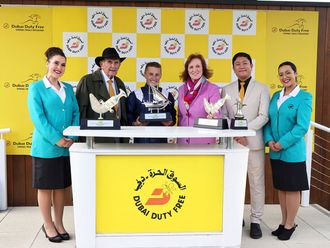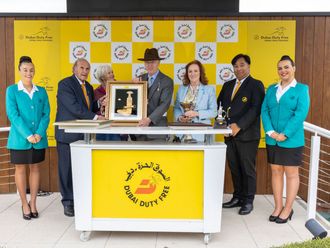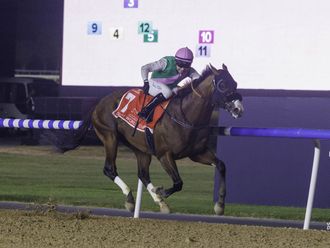
Dubai: The information gurus would have you believe that you need to know the secrets of horse racing in order to pick a winner. So you drown yourself in information as you bid to dig up the undisclosed truths that will tell you which horse in a field of 14 will win. But you still don't get it right.
True, there is no sure-fire process to pick out a winner, but perhaps a little understanding of the handicapping system will help, and who better to hear it from than Melvin Day, the Emirates Racing Authority's official handicapper. Excerpts from an interview:
Gulf News: Can you tell us a bit about what you do as a handicapper, and how the handicapping system works?
Melvin Day: My job falls into two or three parts. Firstly, I'm responsible for making sure that all horses are qualified to run and that the weights they are given are correct according to the conditions of the race and the ratings. I'm responsible on declaration day for adjusting any weights up or down according to the rules.
And the best part of the job is reassessing the horses once they've run and determining which horses' rating need adjusting according to how they performed. Horses that run well go up in the handicap ladder just like in golf or tennis, and the ones that run poorly deserve to come down the handicap.
To put it simplistically handicapping is a merit-based system. The other part I'm involved in is with race planning because I know the horse population and I will propose what races we can run.
What in your opinion is a perfectly handicapped race?
What you want as a handicapper is you want to make all the horses competitive and the idea is to make them all dead-heat, which is virtually impossible as they have different levels of fitness, the draw, jockeyship but what you want to see in a race is to see most of the horses in contention and looking like they've all got a chance.
That's what everybody wants, the owners, trainers, the public. What you like to see in a handicap is the top weight and bottom weight fighting it out in a photo-finish. That's the general idea.
How much of a challenge is it to handicap horses for an event like the Carnival?
European horses don't present too much of a problem because we start with the official ratings from France, Germany, Italy, Ireland and England. America don't have a handicap system while South American horses present a bit of a problem and it is a challenge.
Hopefully one day there'll be a universal ratings system, and I think we're getting there. Things have really, really come a long way going back to say 10 years ago when it was basically Europe and nobody else that had a ratings system in place but now there is Singapore and Hong Kong and handicappers are working closely throughout the world.
Since you're the man with all the inside knowledge, how good or bad a tipster are you?
When you look at a race you think this horse has got a really good chance, especially in stakes races, where the rates are determined by a penalty, and age. It's not a handicapping system.
As a handicapper you don't tend to criticise yourself. Honestly I don't think I'm any better a tipster than anybody else. You have your own opinions, but I look at things in a different light to a lot of people. I don't just pick certain horses, or pick certain jockeys, or pick certain trainers, I try and look at the whole picture.
Can you recall any particularly races that are really difficult to handicap?
Conditions races are sometimes very difficult, especially when they are slowly run because you can often get misleading results and it's those ones that you need to sort out. Also, when you get the first two horses finishing very close and the third horse far off, that can be a bit of a challenge at times. But hopefully you don't get too many of those.
You have a really interesting job and I can't see you doing anything else. But what if you had never become a handicapper, what would you have been doing?
(Laughs.) ... driving a rickshaw, I don't think I could do much other than handicapping.












